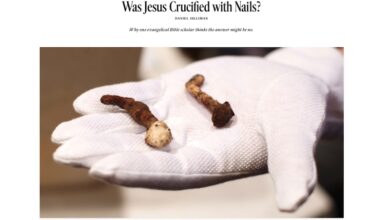Every day, at least 4 Nigerian Christians die for following Christ
“It has been so difficult. I am suffering with my children … you can’t stop remembering and feeling the pain,” states Victoria, a Nigerian Christian.
For Victoria, that pain began the day Boko Haram took her northern Nigerian village of Dzangola by surprise. She remembers how the militants were dressed in the uniforms of Nigerian soldiers. Before she and her husband could react, the fighters had surrounded them. The extremists took her husband and carried him to the roadside. Victoria cried out for mercy, but they pushed her aside and killed her husband. All she could do was lie by his side and weep.
Living without a husband in Nigeria comes with incredible challenges. “The pain of the heart cannot leave just like that,” she says. “Sometimes you just remember all the tragic events — and when things are not coming in for food or school fees, I feel pain.”
Victoria isn’t the only one who has lost a husband in Nigeria because they were Christians — and she won’t be the last. In the West African nation — Africa’s most populous country — death for following Jesus is all-too-common. Every day in Nigeria, approximately four Christians die for their faith.
READ: Nigerian bride and bridesmaids killed on way to wedding
To put that into perspective, eight Christians a day worldwide were killed from November 2018 to November 2019. That means nearly half of the believers killed each day were Nigerian. For the year, 1,350 Christians died in the country — out of 2,983 reported deaths worldwide. It’s most likely countless other deaths occurred but were not reported.
And our World Watch Research Unit tells us those numbers are actually higher. Fewer numbers of Christians killed for their faith were reported due in part to Muslim Fulani militants who partly changed their persecution tactics. Instead of focusing on raiding Christians’ homesteads and communities like we’ve seen over the past few years, extremists put more emphasis on kidnappings and roadblock killings (militants set up a fake roadblock, stop a bus or vehicle and church religious IDs, separating Muslims from non-Muslims).
One pastor we met in Nigeria described the current environment in the northern region as a survival culture — “You lay your head down at night, not knowing if you’ll wake,” he says.
In Nigeria, especially the northern part of the country where radical Islam has spread widely and rapidly, Christians are targeted by extremists on multiple fronts—including Muslim Fulani militant herdsmen, Boko Haram and now Islamic State West African Province (ISWAP), a splinter arm of Boko Haram that has pledged allegiance to ISIS.
Extremists’ agenda to rid the country of “infidels” and spread their radical form of Islam were spelled out in full view in late December 2019.
The video release of the execution of 11 Nigerian Christians by ISWAP on December 28, 2019, offered specific evidence of their beliefs and intent—mirroring the same message ISIS sent almost five years ago when they beheaded 21 Christian men on the Libyan coast. In both videos, the martyrs wore orange jumpsuits, their killers in black. Reportedly, it is the largest group killed by ISWAP so far.
READ: Persecution of Christians now being powered by technology
“This message is to the Christians in the world,” ISWAP said in the 56-second propaganda video, making their agenda crystal clear to attack the church and eradicate any peace or hope.
Rev. Marcus knows firsthand what it feels like to targeted by Boko Haram. The Christian village where he leads a church has endured repeated attacks by the radical Islamic group.
“Before Boko Haram attacked us, we were living in peace with one another, in the church and in the markets, even in school — our children were all living in peace and very happy.”
He remembers the day in 2014 when they were attacked:
“When they came to our town, they destroyed the villages, burned down the churches, ransacked homes and killed men and women. Our people fled and deserted the villages and the church stopped meeting. Also, Boko Haram burned down all the churches in nearby Mubi, but none of the mosques were destroyed.
“After several months, Boko Haram left our town and I returned. There were very few of us. Some came late at night and entered their homes.
“Everyone’s heart was frightened. We were all full of trauma. When we came back, some of the churches had blood on the walls. Anyone who saw it or heard about it didn’t want to go to church anymore.
“The attack put a lot of fear in the hearts of many. People thought if they went to church, they might get attacked, too. So many people didn’t return to the church at the time. And with all that happened, the spiritual life of many became very weak. When you walk with the Lord and these things happen to you, there is great disappointment, fear and loss of trust and hope. I was so scared. Truly speaking, my faith was shaken.”
Believers violently attacked by Muslim Fulani militant herdsmen report similar trauma. In Nigeria’s Middle Belt, clashes with extremists among the predominately Muslim group have claimed the lives of thousands of Christians, as the militants raze entire villages at night and kidnap Christians in fake roadblocks, typically armed with sophisticated weapons like AK-47s.
Jummai, a survivor of a deadly Fulani militant attack in the village of Ninte, recalled what life was like after she returned home: “When evening comes, we start to worry if the enemy will come [back] during the night. When it is still afternoon, we are happy. But when night comes, we don’t know what might happen to us.”
As climate change and environmental factors have forced these militant herdsmen south in search of grazing land for their cattle, they come into contact and conflict with the large pockets of Christian farmers in Nigeria’s Middle Belt — regarded as the breadbasket of northern Nigeria because most of the villagers there are grain farmers who grow food for the whole country.
The militants find a reason to be angry at a particular village and involve the local Muslim population in the area–inciting them to burn down entire Christian villages the militant herdsmen then use as grazing land.
But both believers and many experts say this onslaught is far greater than a violent effort to grab grazing land. They believe they are targeted because they are Christians and that these attacks are part of an agenda to Islamize Nigeria. In the attacks, Christians are indiscriminately targeted and Muslims — and mosques — are mostly spared.
In 2018, the Catholic bishops of Kaduna — an area that has suffered many attacks—recently issued a statement, saying, “The Fulani want to subjugate Christians, disintegrate the country, weaken the gospel and destroy the social and economic life of the people.”
According to the expansionist principle of Dar al Islam (house of Islam) that many radical Fulani hold to, everything belongs to Allah directly and to his followers indirectly, including the land where the these extremists want to let their cattle graze.
“They believe it is right for them to take those resources by force from infidels and apostates,” explains former Open Doors’ West Africa researcher Arne Mulders.
As nations across the world continue to battle the coronavirus pandemic, Nigeria is no exception. President Buhari recently signed lockdown legislation for all major cities.
Currently, Nigeria has reported 131 cases as of March 30, however experts question the validity of that number due to a severe lack of testing kits. On March 22, Nigeria’s Center for Disease Control revealed the country had tested only 152 people. Only a few days later, after the country received testing supplies from Chinese businessman Jack Ma, Nigeria reports its testing capacity had increased by 32 percent. Reportedly, the country’s public health infrastructure and supplies are still low. And Nigeria’s minister of health has suggested that it’s likely infected people are currently in hiding.
In the country of 192 million people, the outbreak has hidden consequences, especially for the 2 million people displaced by violence in northeast Nigeria who find themselves in overcrowded camps. And in remote areas, such as Dzangola where Victoria lives, attaining medicine and proper healthcare is difficult.
Our Africa team director shares: “We are holding our breaths. Here is hoping that the remoteness of Christian villages in Shariah states would actually be to their protection. And may the fact that the illness doesn’t distinguish between ethnicity and religion be a driver of equal treatment of all.”
She, however, isn’t confident that situation will materialize: “In truth I don’t think there is much reason for Christians to expect anything different from what they experienced so far: exclusion.”
Yet even during the violence and threat of future attacks from the Islamic State, militant Fulani herdsmen and Boko Haram—the hope of Christ is still present with the church in Nigeria.
Though she has lost her husband and still grieves for him, Victoria’s hope remains steadfast in the Lord. She says she gets all her strength from God. “I believe if I commit and submit to God, He will help me in all I do.”
Jummai in Ninte says that every morning, she thanks God for His protection. She is walking out her faith and trust in Jesus. “We slept in the night, not knowing what we would see the next day. But then His power awakened us. So then I tell Him: ‘Thank you.’”
Since Boko Haram’s attack on his village and church, Pastor Marcus has walked in faith, one step at a time. His words for the church in the U.S. are both inspiring and encouraging — reminding us that to live is Christ and to die is gain.
“Before Boko Haram attacked, we were weak, but after this we have become very strong in the faith,” he says. “We do not pray that God will take away the hardship, but that God would give us the grace to be able to stand.”
Although the realities of this violent situation can be overwhelming, Open Doors has repeatedly seen how the Lord sovereignly uses the Body of Christ to bring hope and remind Christians on the front lines that they are not forgotten.
“My house was totally burned down in the Fulani crisis,” says Mary Lumumba. “I have been going from house to house, begging for a bowl of corn to feed my children, but today you have given me 100 kilograms of maize all to myself. God indeed is faithful. May God bless every pocket that gave to see that we are being helped.”
As persecuted believers like Mary Lumumba, Victoria in Dzangola and Pastor Marcus continue to walk in faith, they have linked arms with Open Doors to receive support like trauma counseling, food aid and clean drinking water.
Victoria says the trauma counseling she and so many others in her village have received has been integral to her healing. “Your teachings are very helpful; it teaches us how to live, how to manage the little food we have and how to bring up our children.”
Pastor Marcos points to encouragement as one of the key factors in his church’s and village’s restoration: “You kept encouraging and training us,” Pastor Marcos says. “Because of these teachings, a lot of people became encouraged and strengthened to stand strong and they returned to the church. Today, our church is full, and the greatest source of our encouragement came from you—through your teachings, encouragement and the support you have given.
“We can’t quantify our gratitude, and only God can reward you. You have really strengthened our hope in God.”
–Linda Lowry | Open Doors USA | reporting from Africa







